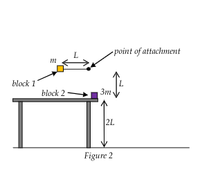
A small block (block 1) of mass m, attached to an ideal string of length L, is initially held so that the string is taut and horizontal at height Labove a frictionless table, as shown in Fig.2. A second small block (block 2) of mass 3mis placed on the table right under the point of attachment of the string holding block 1. The tabletop is at height 2L above the floor. Block 1 is then released from rest and collides elastically with block 2 at time t=0. The acceleration due to gravity has magnitude g and air resistance is negligible.
a) Determine the horizontal distance traveled by block 2as a projectile.
b)Determine the speed and direction of motion of block 1 right after the collision.
c) Determine the maximum angular displacement (measured from the vertical direction) of block 1 after the collision.

Step by stepSolved in 4 steps with 11 images

- A uniform ladder with mass m₂ = 14kg and length L = 3.2m rests against a smooth wall. A do-it-yourself enthusiast of mass m₁ = 70kg stands on the ladder a distance d = 1.2m from the bottom (measured along the ladder.) There is no friction between the wall and the ladder, but there is a frictional force, with μ = 0.25, between the floor and the ladder. N₁ is the magnitude of the normal force exerted by the wall on the ladder, and N₂ is the magnitude of the normal force exerted by the ground on the ladder. What angle 8, will cause the static friction with the floor to be maximized? Will the ladder start to slip when the angle is made larger, or smaller than this borderline value? m₂ 20 f L mi 1) Draw a free body diagram for the ladder, choose a coordinate system and write out the equations for the sum of the x forces and the sum of the y forces. 2) Draw a diagram of the ladder with each force vector acting on it at its point of application. Chose an axis of rotation and place this on the…arrow_forwardProblem 1. Find the horizontal force magnitude P needed to start the motion of the block with mass mo in two scenarios: (a) when P is applied to the right and (b) when P is applied to the left. Develop a general solution for each scenario, and subsequently, substitute the values 0= 25°, m = mo = 2.5 kg, µs = 0.40, and μk = 0.35 into your expressions for evaluation. Hgs H k P (a) A mo 0 m P (b) Barrow_forwardProvide Solution for the Attachmentarrow_forward
 Elements Of ElectromagneticsMechanical EngineeringISBN:9780190698614Author:Sadiku, Matthew N. O.Publisher:Oxford University Press
Elements Of ElectromagneticsMechanical EngineeringISBN:9780190698614Author:Sadiku, Matthew N. O.Publisher:Oxford University Press Mechanics of Materials (10th Edition)Mechanical EngineeringISBN:9780134319650Author:Russell C. HibbelerPublisher:PEARSON
Mechanics of Materials (10th Edition)Mechanical EngineeringISBN:9780134319650Author:Russell C. HibbelerPublisher:PEARSON Thermodynamics: An Engineering ApproachMechanical EngineeringISBN:9781259822674Author:Yunus A. Cengel Dr., Michael A. BolesPublisher:McGraw-Hill Education
Thermodynamics: An Engineering ApproachMechanical EngineeringISBN:9781259822674Author:Yunus A. Cengel Dr., Michael A. BolesPublisher:McGraw-Hill Education Control Systems EngineeringMechanical EngineeringISBN:9781118170519Author:Norman S. NisePublisher:WILEY
Control Systems EngineeringMechanical EngineeringISBN:9781118170519Author:Norman S. NisePublisher:WILEY Mechanics of Materials (MindTap Course List)Mechanical EngineeringISBN:9781337093347Author:Barry J. Goodno, James M. GerePublisher:Cengage Learning
Mechanics of Materials (MindTap Course List)Mechanical EngineeringISBN:9781337093347Author:Barry J. Goodno, James M. GerePublisher:Cengage Learning Engineering Mechanics: StaticsMechanical EngineeringISBN:9781118807330Author:James L. Meriam, L. G. Kraige, J. N. BoltonPublisher:WILEY
Engineering Mechanics: StaticsMechanical EngineeringISBN:9781118807330Author:James L. Meriam, L. G. Kraige, J. N. BoltonPublisher:WILEY





